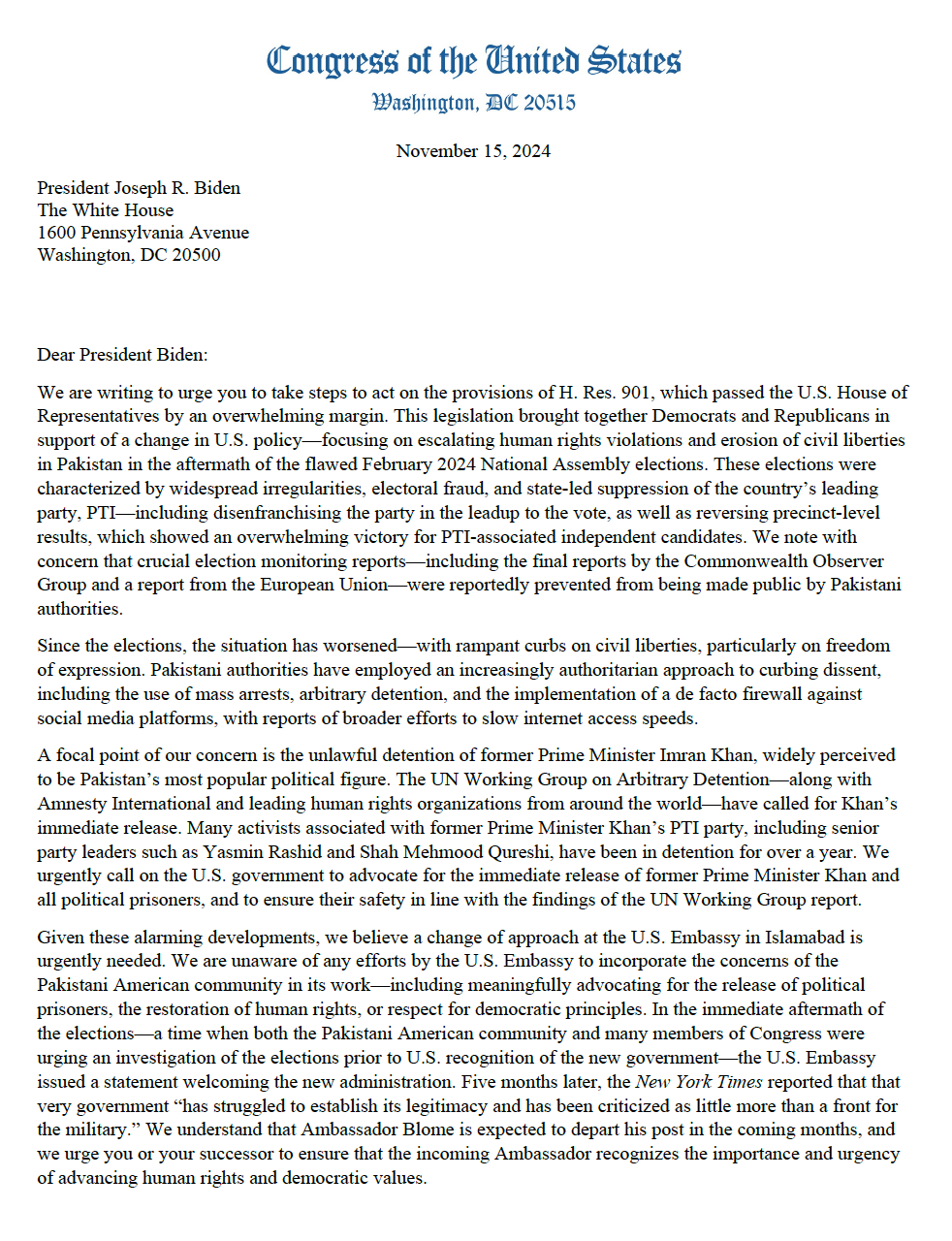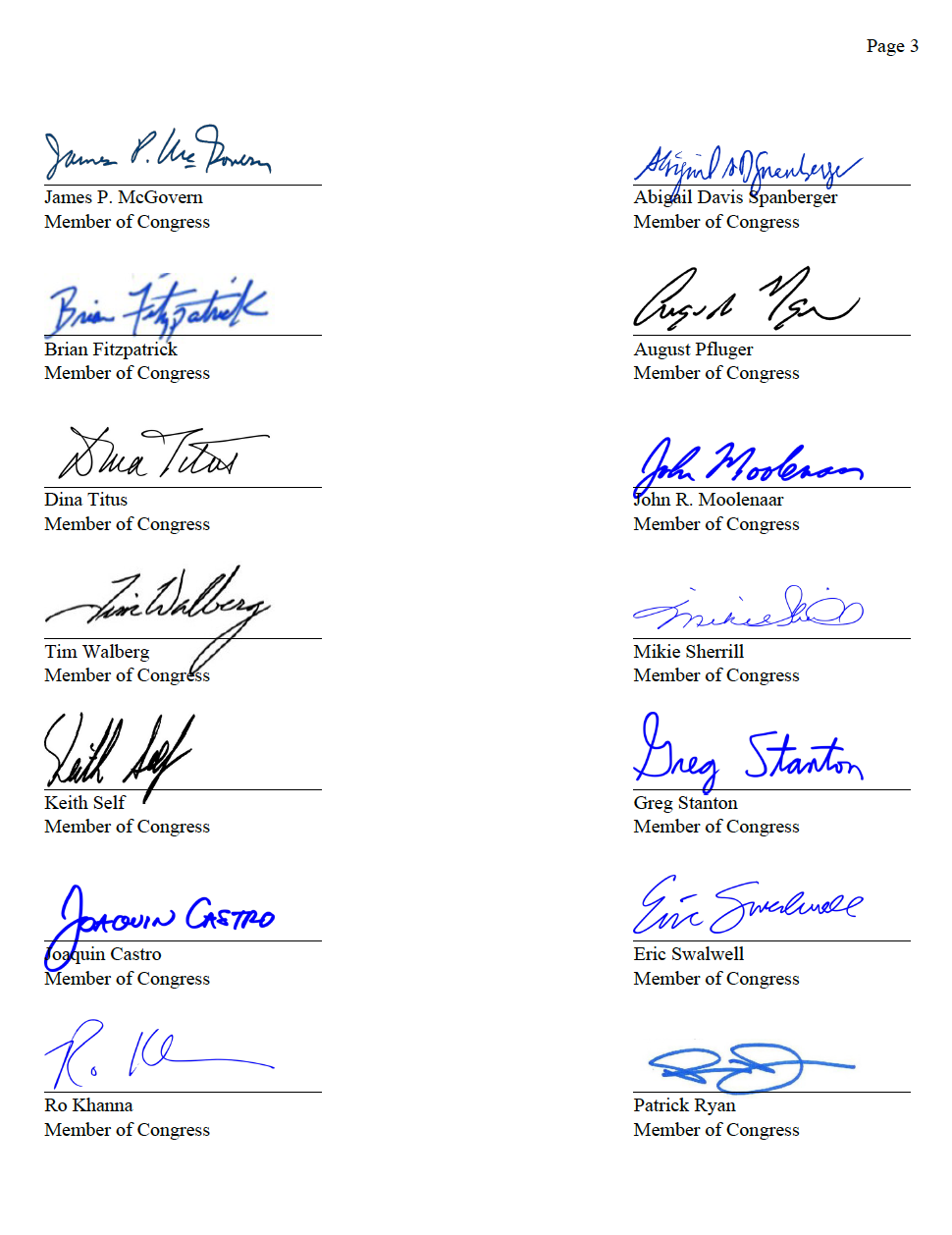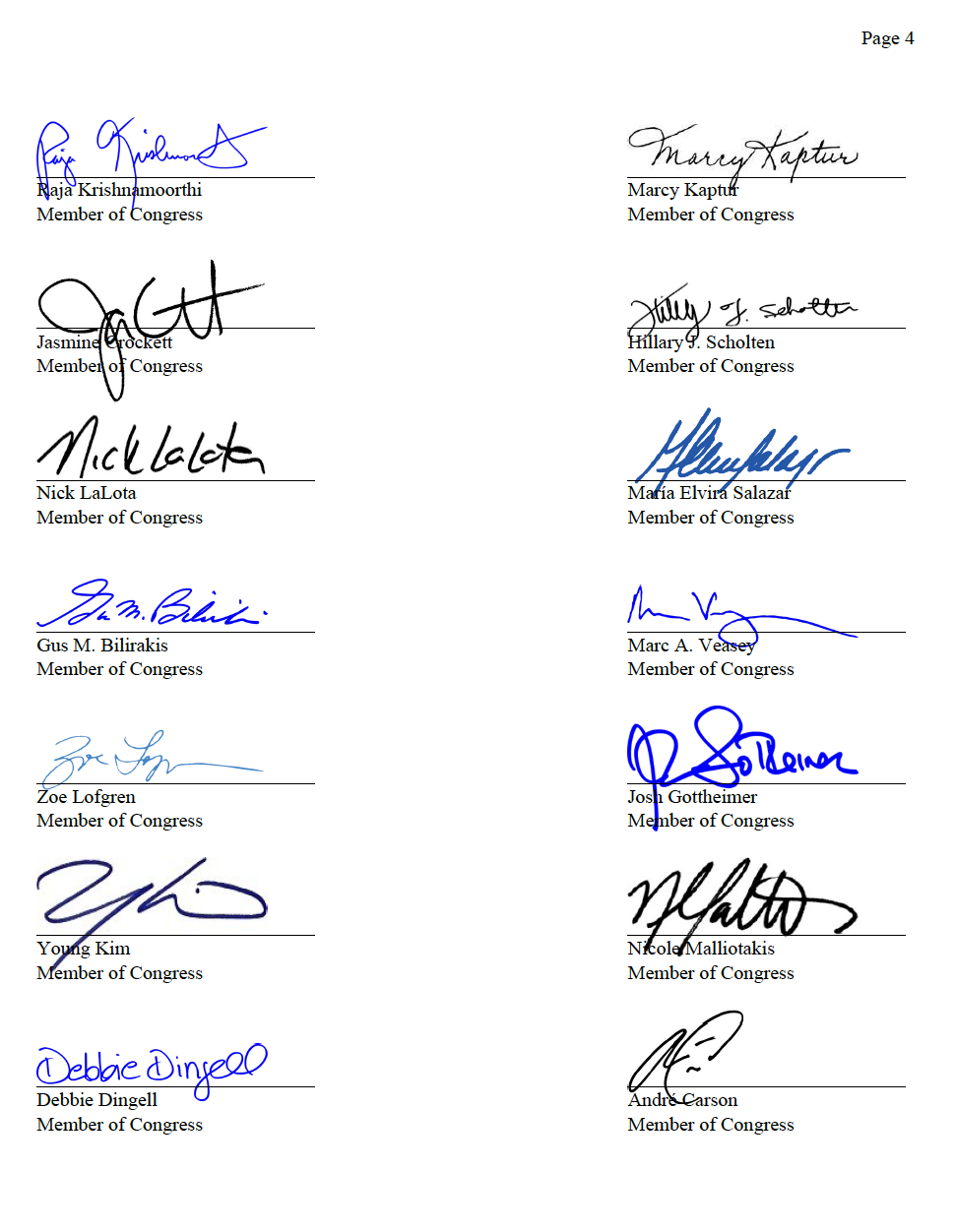Press Release
November 15, 2024
For Immediate Release
Contact: Mehlaqa Samdani, mehlaqa.samdani.capj@gmail.com or dc.office@changeuspakpolicy.org
--------------
With new bipartisan letter to White House, 99 Members of U.S. Congress join calls for Imran Khan’s release, condemn Asim Munir’s authoritarian crackdown
A second, bipartisan letter from dozens of respected foreign policy voices in Congress signals unprecedented U.S. pressure on the military regime over rigged elections and political prisoners
Washington, D.C. — As Pakistan’s pro-democracy movement prepares for a major protest in Islamabad on November 24th, prominent members of the House Foreign Affairs Committee have sent the first bipartisan letter — signed by 46 members of Congress — urging the White House to “advocate for the immediate release of former Prime Minister Khan and all political prisoners.”
The letter comes just weeks after a similar push by over 60 House Democrats, bringing the total number of members of the House and Senate that have called for the release of Imran Khan and other political prisoners to nearly 100. Together with calls by Amnesty International and the United Nations Working Group on Arbitrary Detention, the release of this second letter from U.S. Congressmembers marks a new high point in international condemnation of the politically-motivated incarceration of Pakistan’s most popular political leader — and an unknown number of other pro-democracy activists — by the regime of General Asim Munir in Pakistan.
This new bipartisan letter — signed by several incoming Senators as well as leading members of Foreign Affairs and Intelligence Committees — is critical of State Department’s response to the deeply flawed elections in February, decrying State Department officials’ failure to “meaningfully advocat[e] for the release of political prisoners, the restoration of human rights, or respect for democratic principles,” and concluding that “a change of approach at the U.S. Embassy in Islamabad is urgently needed.”
The letter states that “[s]ince the elections, the situation has worsened—with rampant curbs on civil liberties, particularly on freedom of expression,” adding that the Asim Munir-led regime has “employed an increasingly authoritarian approach to curbing dissent, including the use of mass arrests, arbitrary detention, and the implementation of a de facto firewall against social media platforms, with reports of broader efforts to slow internet access speeds.
The members specifically object to the State Department’s actions in the aftermath of the widely-panned elections, noting that even as “both the Pakistani American community and many members of Congress were urging an investigation of the elections prior to U.S. recognition of the new government—the U.S. Embassy issued a statement welcoming the new administration.” They conclude by urging President Joe Biden or his successor Donald Trump to “ensure that the incoming Ambassador understands the importance and urgency of advancing human rights and democratic values.”
The letter is signed by several leading voices on U.S. foreign policy and national security from both parties, including Senators-elect Adam Schiff (D-California) and Elissa Slotkin (D-Michigan) as well as Joe Wilson (R-South Carolina), the chair of the House Foreign Affairs Committee Subcommittee on Central Asia,Young Kim (R-California), the chair of the House Foreign Affairs Subcommittee on the Indo-Pacific, and Congressional Pakistan Caucus co-chair Jack Bergman (R-Michigan).
The letter is also signed by both members who led House Resolution 901 on democracy in Pakistan, Dan Kildee (D-Michigan) and Rich McCormick (R-Georgia). That resolution advanced out of committee 50-0 and passed the House by a vote of 368-7, and this letter calls on the Biden administration to heed its demands. The presence of the two co-leads of H. Res. 901 indicates that the sentiments in the letter are likely to be reflective of a growing consensus in the U.S. Congress.
Lead sponsor Rep. Susan Wild of Pennsylvania — the top Democrat on House Foreign Affairs’ subcommittee with jurisdiction over human rights — has been among Congress’s most consistent and thoughtful champions for a U.S. policy that prioritizes democracy and human rights in Pakistan. She was the first member of Congress to condemn the election fraud in February, and co-led a letter in late February in response to Pakistan’s widely-condemned February elections that called for the Biden administration to withhold diplomatic recognition of the new Pakistani government until democracy was restored.
Full list of signatories (alphabetical): Bergman, Bilirakis, Burchett, Burgess, Carson, Castro, Costa, Crockett, D’Esposito, Dingell, Fitzpatrick, Gottheimer, James, Johnson (GA) Kaptur, Khanna, Kildee, Kim (CA), Krishnamoorthi, LaLota, Lawler, Lofgren, Malliotakis, McCormick (GA), McGovern, Moolenaar, Moran, Pfluger, Ryan, Salazar, Schiff, Scholten, Self, Sherrill, Slotkin, Spanberger, Stanton, Swalwell, Thanedar, Titus, Van Duyne, Veasey, Walberg, Weber, Wild, Wilson.
Full text of letter:
November 15, 2024
Dear President Biden:
We are writing to urge you to take steps to act on the provisions of H. Res. 901, which passed the U.S. House of Representatives by an overwhelming margin. This legislation brought together Democrats and Republicans in support of a change in U.S. policy—focusing on escalating human rights violations and erosion of civil liberties in Pakistan in the aftermath of the flawed February 2024 National Assembly elections. These elections were characterized by widespread irregularities, electoral fraud, and state-led suppression of the country’s leading party, PTI—including disenfranchising the party in the leadup to the vote, as well as reversing precinct-level results, which showed an overwhelming victory for PTI-associated independent candidates. We note with concern that crucial election monitoring reports—including the final reports by the Commonwealth Observer Group and a report from the European Union—were reportedly prevented from being made public by Pakistani authorities.
Since the elections, the situation has worsened—with rampant curbs on civil liberties, particularly on freedom of expression. Pakistani authorities have employed an increasingly authoritarian approach to curbing dissent, including the use of mass arrests, arbitrary detention, and the implementation of a de facto firewall against social media platforms, with reports of broader efforts to slow internet access speeds.
A focal point of our concern is the unlawful detention of former Prime Minister Imran Khan, widely perceived to be Pakistan’s most popular political figure. The UN Working Group on Arbitrary Detention—along with Amnesty International and leading human rights organizations from around the world—have called for Khan’s immediate release. Many activists associated with former Prime Minister Khan’s PTI party, including senior party leaders such as Yasmin Rashid and Shah Mehmood Qureshi, have been in detention for over a year. We urgently call on the U.S. government to advocate for the immediate release of former Prime Minister Khan and all political prisoners, and to ensure their safety in line with the findings of the UN Working Group report.
Given these alarming developments, we believe a change of approach at the U.S. Embassy in Islamabad is urgently needed. We are unaware of any efforts by the U.S. Embassy to incorporate the concerns of the Pakistani American community in its work—including meaningfully advocating for the release of political prisoners, the restoration of human rights, or respect for democratic principles. In the immediate aftermath of the elections—a time when both the Pakistani American community and many members of Congress were urging an investigation of the elections prior to U.S. recognition of the new government—the U.S. Embassy issued a statement welcoming the new administration. Five months later, the New York Times reported that that very government “has struggled to establish its legitimacy and has been criticized as little more than a front for the military.” We understand that Ambassador Blome is expected to depart his post in the coming months, and we urge you or your successor to ensure that the incoming Ambassador recognizes the importance and urgency of advancing human rights and democratic values.
We are convinced that the United States can and must do better. Both our fundamental principles and our long-term interests compel us to advance a U.S. policy toward Pakistan which places the human rights, dignity, and aspirations of the people of Pakistan at its core. Ultimately, we believe that the many vital interests that our countries share can only be effectively and sustainably advanced if accompanied by a U.S. approach driven by a robust commitment to the democratic process and universal rights.
We appreciate your attention to these urgent matters and look forward to further engagement with your Administration on how U.S. policy can contribute to a restoration of democracy and the protection of human rights in Pakistan.
Sincerely,
[Members of U.S. Congress]




